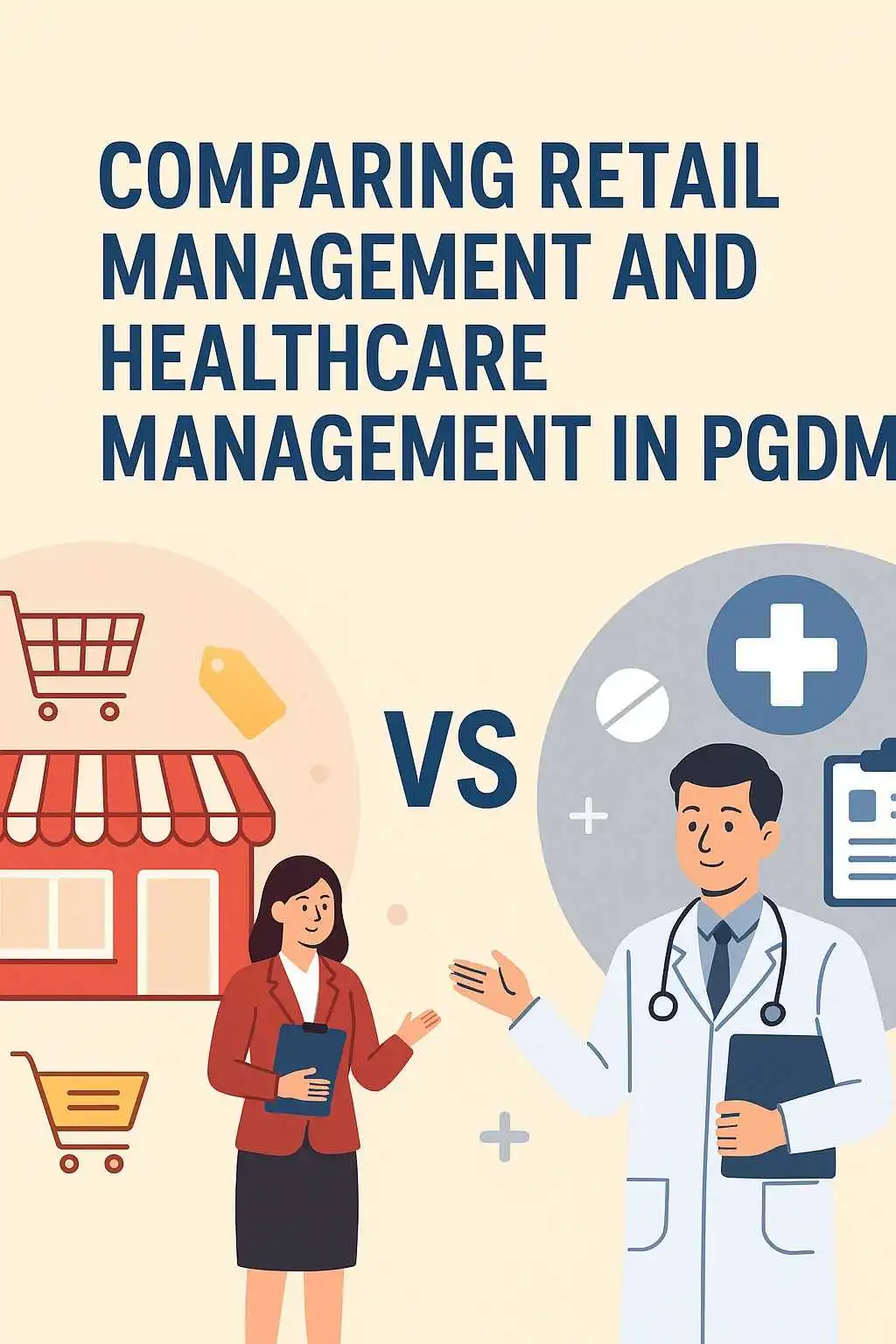In today’s extremely competitive work market, it is a known fact that gaining specialist knowledge and abilities is essential for professional advancement and success. According to recent research, there is a notable rise in the need for Post Graduate Diploma in Management (PGDM) graduates to fill the knowledge and skill gap in the changing corporate environment. Nonetheless, PGDM provides prospective young professionals with various speciality options. Today, two important specialisations will be evaluated —the retail management diploma and PGDM in health care management, along with how Welingkar Institute of Management provides the best of both these courses.
PGDM Retail Management vs. Healthcare Management: Course Duration and Eligibility
The two-year PGDM program in retail and healthcare management is broken up into four semesters. Candidates must have a bachelor’s degree in any field with an aggregate of at least 50% for all categories to be considered for admission to PGDM. Nonetheless, applicants may also be undergraduate students who are in their last semester or year of study. It is also necessary to have a valid score on the CAT, MAT, ATMA, CMAT, or an equivalent admission exam. The likelihood that working professionals will be accepted into the program is increased by the fact that many institutions favour applicants with previous work experience.
PGDM Retail Management vs. Healthcare Management: Curriculum
Those with a strong interest in managing retail operations, merchandising, marketing, and customer service are catered to by the PGDM program in retail management. This curriculum typically covers topics like retail marketing, visual merchandising, supply chain management, and customer relationship management. Furthermore, students are free to choose elective courses like digital marketing, e-commerce, or luxury brand management that fit with their specific interests and professional goals. An essential part of this program is hands-on training and internships, where students can participate in merchandising projects, sales simulations, and retail store visits.
The PGDM program in healthcare management is designed to give students the information and abilities they need to manage and administer healthcare organisations and facilities. Healthcare policy, healthcare administration, healthcare finance, healthcare ethics, and healthcare information systems are among the fundamental topics covered in this program. As an alternative, students may choose to take elective courses in healthcare marketing, healthcare quality management, or health informatics. Internships in clinics, hospitals, healthcare consulting firms, or healthcare facilities are required by students pursuing healthcare management. An important component of the curriculum is practical training, which includes case studies about healthcare management, exposure to healthcare IT systems, and trips to hospitals and healthcare facilities.
PGDM Retail Management vs. Healthcare Management: Career Opportunities
E-commerce and online selling have significantly changed the retail industry. As such, there is a significant need for experts in digital marketing, online sales tactics, and e-commerce administration. As a result, a variety of job opportunities have been made possible by the increasing need for qualified individuals in retail management, making it a good choice for young professionals.
Graduates can look into jobs like retail store managers, who are in charge of overseeing day-to-day operations and providing outstanding customer service. When it comes to creating visually appealing in-store displays and layouts, visual merchandisers are essential. Supply chain managers are needed to maximise inventories and logistics. While category managers concentrate on product selection and pricing, e-commerce managers handle the online retail environment. Additionally, data analysts use data to make well-informed decisions, while market research analysts collect consumer insights.
However, the need for healthcare professionals has grown as a result of the global ageing population, the incorporation of healthcare IT, and the upgrades of healthcare laws and policies. Following graduation, these professionals can find employment in a variety of settings, including clinics, hospitals, pharmaceutical businesses, healthcare consulting firms, and health insurance companies. They may be employed in these fields as managers or administrators of healthcare facilities, in charge of effectively running clinics, hospitals, and assisted living facilities. Pharmaceutical and medical device companies also hire experts for roles in marketing, sales, regulatory affairs, and market research.
Managers of health informatics improve healthcare delivery by working on technological and data solutions. Managers of quality and safety make sure that patient safety and standards are followed. The formulation and study of healthcare policies is the primary focus of health policy analysts and consultants. A PGDM in hospital and healthcare management course makes experts and planners also create and optimise healthcare facilities.
Conclusion
For aspiring professionals, PGDM in Retail Management and PGDM in Healthcare Management provide distinctive career paths. A postgraduate degree in retail management prepares students for a successful career in the retail industry. A PGDM in Healthcare Management, from WeSchool, for instance, prepares students to handle the administrative aspects of the healthcare sector. Both programs have a bright future because of the changing demands in their respective sectors. Regardless of whether a person chooses to pursue a degree in healthcare administration or retail, a PGDM can lead to fruitful and satisfying employment options.






